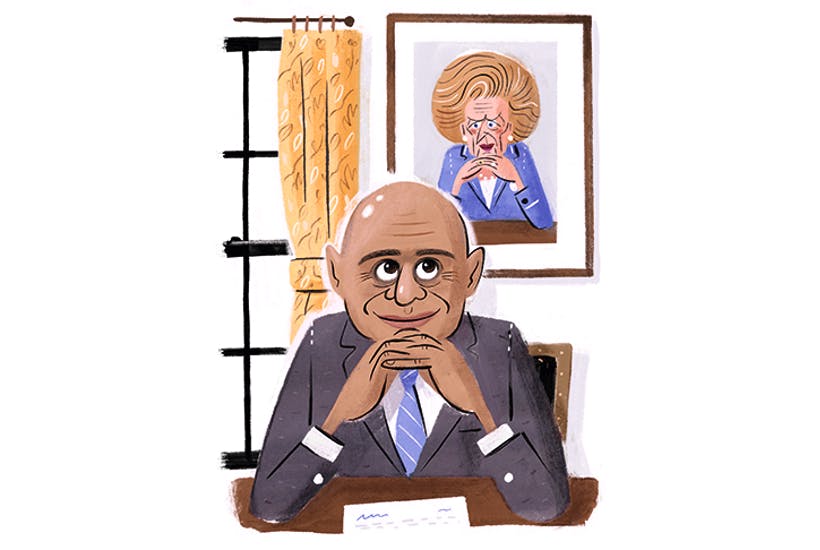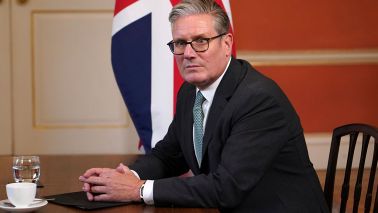“I entered politics to do my best for this country,” says Sajid Javid in the video that launches his campaign, “the country that has done so much for me”. A good point, which he didn’t elaborate. A shame, because a powerful point lies therein – a point that explains who he is and his claim for the job.
Had his parents stayed in Punjab and not emigrated to Britain in the 1960s, he’d have grown up in poverty there, rather than here. What would his life have been like then? And why was it better here? The answer isn’t about natural resources or the weather: the answer lies in politics. Sometimes, the characteristics that make Britain great are best described (and appreciated) by those who are mindful that, for a twist of fate, they would have grown up somewhere else.
“I’m standing to be the next leader of the @Conservatives & Prime Minister of our great country. We need to restore trust, bring unity and create new opportunities across the UK. First and foremost, we must deliver Brexit” – @sajidjavid
Join @TeamSaj to help us do just that. pic.twitter.com/LqWHidWp0M
— Team Saj (@TeamSaj) May 27, 2019
That’s why Sajid Javid’s candidacy for Prime Minister is fascinating: it’s the first time anyone with his background has run for a job like this, ever. He’s the ninth candidate to declare, and chose a busy news day to do so – perhaps he won’t get much notice. But as a character and a politician, I think he merits attention.
I once heard him asked why he joined the Conservatives. He said he often thinks about what would have happened if his parents (who knew each other in the same village) had stayed in Punjab. And he knows for sure that he would not have had a tenth of the opportunity he has enjoyed here. His UK upbringing was, by our standards, impoverished. He lived on what was once dubbed Britain’s most dangerous street (he’d have done better to film today’s video on that street, rather than in his office wearing a suit, but never mind). His (illiterate) mum took him to a library after school so he could learn, he went to Exeter Uni, then the City where he became vice-president of Chase Manhattan bank by his mid-20s. This is what Michael Howard, in his best ever speech called “the British dream”.
But when explaining why he became a Tory, Javid goes beyond the “England made me” narrative. He owes everything not just to the country, he says, but the Conservative Party and the philosophy upon which it stands. The Thatcher reforms created an explosion of opportunity, including the Big Bang that allowed new banks (like Chase Manhattan) to come along and employ people who looked like him. Rightly or wrongly, he felt he lacked the old school tie for the Barings and the old City firms. And he saw Conservatism as an insurgent force which cleared the way for young kids like him to rise as far as their work and talents would allow. He could have stuck at banking, but in his 30s he thought he’d done enough and wanted to join politics to see if he could give back and make stories like his less rare.
I have my criticisms of Sajid Javid. Mainly: what good is this story if you can’t tell it? He’s uninterested in himself: a good trait in a person, but a bad one in a politician. His best lines are ones I’ve heard him say off the cuff in private, but when he says the same in public it can fall flat. For example, I’ve heard people ask him why he’s a Tory and he’s explained in clichés (industry, entrepreneurship, low taxes etc). Phrases that have long ago lost their meaning from overuse. “He sounds like what he is: a banker,” one Cabinet member tells me. The criticisms of him can be class-based: that he doesnt have the right decorum. One nickname I’ve heard is “Sajid Chavid”. The criticisms are presentational: that he lacks oratorical flourish and lyrical resources. And that as a result, he’s a backstory in search of a front-story.
Sometimes he’s seen to lack political nous (the steel crisis , the Shamima Begum incident). But other times, he can have more of it than anyone else: he spotted the scale of the Windrush scandal before others, which is how he ended up as Home Secretary. And he has not, yet, been thrown off this rodeo.
But this is his strength: that he is different, he’s unpretentious, interested only about what he can achieve for others and baffled as to why anyone wants to discuss him personally. He places the substantial above the superficial, not always an advantage in a political culture that can favour the latter. He’s a radical by nature, and was set to launch a £1bn housing programme before he was moved. He closed down the ‘hostile environment’ policy instantly. Moving at this pace brings its share of mistakes (the steel crisis) but at least he moves at pace.
His background matters because of the insights it offers and how it shapes his agenda. For example, most Tory candidates will have grown up in the expectation that they would head to Oxbridge greatness. Sajid is cut from a different cloth. His brother, Baz, quit school aged 16 and joined the Navy (he’s now in the police). Young Sajid was set to drop out as well until a teacher took pity on him and gave him tuition for free, enough to get him over the line into sixth-form college. Until then, everyone in Javid’s family – including him – assumed he would drop out aged 16. Britain loses a hell of a lot of talent this way, and no one ever discusses this because it is, for so many MPs, incomprehensible. Here, Javid could help people who fall into this middle category. And at a time when identity politics is on the rise, he can talk with authority about how the limitations of these labels. A younger generation of voters are more interested in such things than, say, defence or the tax burden.
Jeremy Corbyn talks about Britain as a hideously unequal place, where the rich prosper and the poor are kept down. Sajid Javid is the embodiment of the rejection of that thesis. He’s from a Muslim family but is not religious (and married to a Christian) – his is the unity candidate, in a country that badly needs unity. He is a Remain-supporting Eurosceptic who is unafraid of a no-deal Brexit because his specialty is having the financial knowledge to make a success of it. It could allow him to say he’d deliver the mandate of the referendum, but not in a partisan way, and open a new chapter in Conservatism.
He has a great story to tell: about the forces that shaped him, and how they shaped his political views. But can he tell it, and in a way that inspires voters and activists? Can he provide the hope, unity and cohesion that the demoralised, feuding Tory party needs? In the next couple of weeks, we’ll find out.







Comments